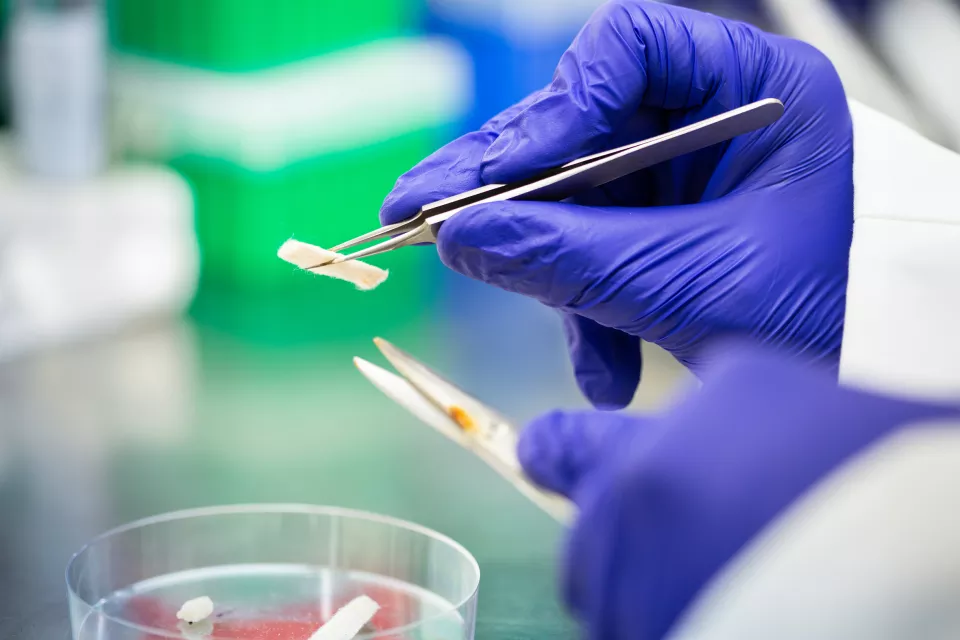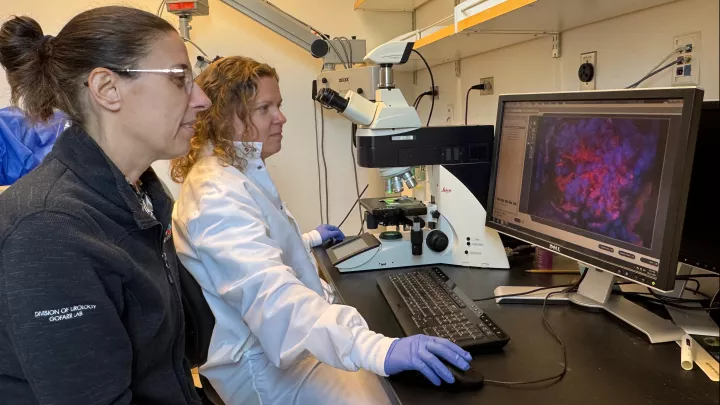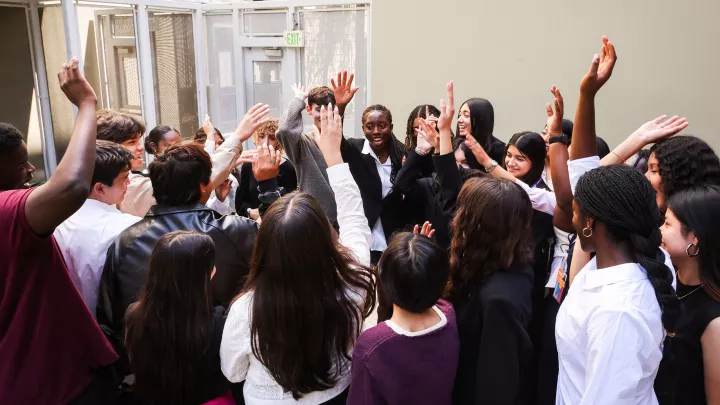As a leading pediatric academic medical center, research is a vital component of Children’s Hospital Los Angeles. Our overarching aim is to foster innovative research to improve the health and wellness of children and ensure the delivery of culturally competent care for diverse pediatric populations.
Every day, our expansive research community works to accelerate life-changing discoveries through a combination of basic, clinical and translational research studies focused on targeting new and better ways to prevent, diagnose and treat childhood diseases.
All research at the hospital happens under the auspices of The Saban Research Institute of Children’s Hospital Los Angeles, which is one of the largest and most productive pediatric research facilities in the United States. Established in 1992, The Children’s Hospital Research Institute became The Saban Research Institute in 2003 following a $40 million gift in support of pediatric research made by Cheryl Saban, PhD, Haim Saban and the Saban Family Foundation.
Research is performed across the hospital’s Sunset Campus within bench laboratories, dedicated clinical research space (including a clinical trials unit), in our inpatient and outpatient clinics, as well as in the surrounding community.
Investigators at The Saban Research Institute provide opportunities for families and communities to participate in research as our partners, joining us in tackling the most pressing challenges to pediatric health that can be addressed by discovery science.
Research Themes
The Institute is organized around four major research themes designed to promote collaboration and innovation in addressing pediatric health challenges:
- Best Starts to Life aims to identify the earliest risk factors, address the impact of health and community disparities, and to deploy science-based interventions—from fetal through early childhood development—to improve the lives of all children.
- From Discovery to Pediatric Care Innovation aims to transform knowledge gleaned from today’s clinical care into new and innovative approaches for tomorrow.
- Pediatric Disease Models and Mechanisms aims to discover the underlying causes of pediatric disease—from genes to environmental factors—as a means to develop novel interventions and cures.
- Personalized Prevention and Care aims to develop an understanding of each child down to the cellular level so that early and effective intervention can provide for a lifetime of sound health and well-being.
Affiliations, Collaborations and Funding
The Saban Research Institute of Children’s Hospital Los Angeles maintains strong scientific and strategic affiliations with the University of Southern California (USC) and the Keck School of Medicine of USC, where CHLA physicians and scientists hold faculty appointments. The Institute’s 396 principal investigators are involved in collaborative projects with academic institutions throughout the U.S. and abroad. The Saban Research Institute consistently ranks in the top 10 children’s hospitals for funding from the National Institutes of Health. In fiscal year 2024, CHLA received $51.4 million in National Institutes of Health (NIH) funding and $109.5 million in total extramural funding.
Education and Mentorship
The Saban Research Institute’s investigators—clinician-scientists, research scientists and health care professionals—work with and mentor the next generation of pediatric innovators. Our training programs include clinical and postdoctoral fellows, graduate students, medical students, undergraduates and high school students. Support is provided through the Training, Education, Career Planning and Development office that promotes the success of Children’s Hospital Los Angeles investigators and trainees through intramural funding programs and by providing opportunities for training, mentoring and collaboration.
Research Programs, Centers and Institutes
At CHLA, Institutes are typically a combination of clinical activities and research. Research Centers and Programs are interdisciplinary with faculty investigators who are members of different divisions and departments at CHLA.
Research
- Community, Health Outcomes and Intervention Research Program
- Developmental Biology and Regenerative Medicine Program
- Developmental Neuroscience and Neurogenetics Program
Clinical Care and Research
- Cancer and Blood Disease Institute
- Center for Endocrinology, Diabetes and Metabolism
- Center for Personalized Medicine
- Fetal and Neonatal Institute
- Heart Institute
- Jackie and Gene Autry Orthopedic Center
- Neurological Institute
- Vision Center
Research Facilities
The Saban Research Building and Smith Research Tower provide more than 150,000 square feet of bench laboratory space dedicated to research. The first floor of The Saban Research Building also provides dedicated space to support on-site behavioral and psychological assessments of subjects and their accompanying families participating in clinical research studies.
Core Facilities
Our scientists have access to advanced technologies, infrastructure, and data science and analyses through shared core facilities. Many of the research core facilities have pilot funding programs to provide investigators with opportunities to acquire necessary preliminary experimental data to demonstrate technical and analytical capabilities.
Core facilities at The Saban Research Institute include:
- Biostatistics and Data Management Core
- Cellular Imaging Core
- Extracellular Vesicle Core
- Flow Cytometry Core
- Human Imaging Core
- Nutrition and Metabolic Core
- Neuropsychology Core
- Small Animal Imaging Core
- Spatial Biology and Genomics Core
- Stem Cell Core
Clinical Research Support Office
The Children’s Hospital Los Angeles Clinical Research Support Office provides assistance for clinical research and studies that require coordinator support and study planning. This centralized resource enables investigators to perform high-quality, patient-oriented research at various venues throughout the hospital and in the community.



